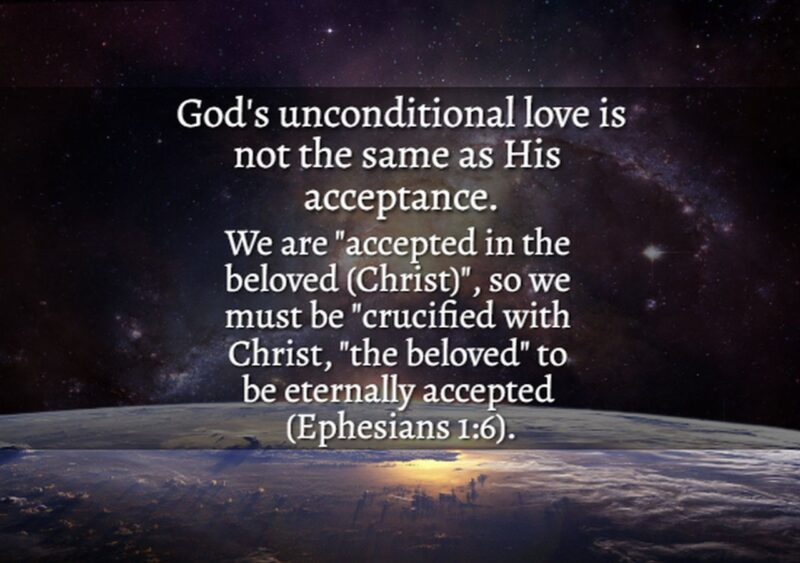Articles
Unconditional Love and Acceptance?

Martin Bobgan, PhD.
Among the stellar emotional needs of humanistic psychology are unconditional acceptance, unconditional self-regard, unconditional self-acceptance, and unconditional love. The meaning of the word unconditional is “without conditions or reservations; absolute.”1 The practical extension of the theories of unconditional love is a permissive attitude and a morally nonrestrictive atmosphere. That means no conditions or restrictions in child rearing, counseling, and other human relationships. Since the parent or counselor is to be giving unconditional love, it must be an absolute love, unrestricted by human feelings or failings, since the very meaning of the word is “absolute.” But, if there is any absolute when it comes to love, it is that human love is limited. It is not what it was originally created to be, even in the best of people and circumstances, except when Jesus Himself is loving in and through a person.
Adler and Maslow considered these “unconditionals” to be basic human needs, essential to a person’s sense of wellbeing. They taught that people need to be loved and accepted unconditionally—without any conditions of performance. Thus their followers teach that parents must love and accept their children unconditionally. Moreover, they encourage all people to love and accept themselves unconditionally.
Adler, Maslow, Rogers and others believed that a human being will find answers to his own dilemmas and naturally blossom into his best self in an atmosphere of unconditional love and acceptance, by which they meant a permissive, unstructured atmosphere. Nevertheless, as much as they would like to think that they themselves loved their clients unconditionally, the truth of the matter is this: people are not able to love unconditionally.
The Myth of Unconditional Love
Unconditional love is a myth. That is because the human is naturally self-biased and the human heart is so deceitful that one can fool himself into thinking that he is loving unconditionally, when in fact he has all kinds of conditions. For instance, what kind of unconditional love and unconditional positive regard is at work when the client can no longer pay for services and therapy is discontinued? Furthermore, even the most nondirective counselors express approval or disapproval in subtle, if not direct, ways.2
The idea of people improving their life in an atmosphere of unconditional love is founded on the premise that people are born good and that their natural inclination to goodness is thwarted by their environment (mainly parents). In such a system, self is the victim of society but finds salvation, freedom, and fulfillment through unconditional self-love and self-acceptance. Unconditional love cannot be based upon performance or it wouldn’t be unconditional. Therefore, it must be based on the intrinsic worth of the person. Paul Brownback, in his book The Danger of Self-Love, explains it this way:
- . . . by unconditional love we are speaking of love on the basis of being rather than doing. One implication of this teaching is the place of grandeur that it gives to the human being. I am lovable just because I am human; therefore being human, in and of itself, regardless of what I do with my humanness, must have some sort of independent value or worth. It is by itself a sufficient claim to respect and esteem.3
Thus, according to these self theories, everyone is born with the right to receive unconditional love and unconditional acceptance throughout his entire life, no matter what!
Pastors assigned to shepherd God’s flocks, should have been alert to the subtleties of deception that would turn a believer’s eyes from God to self. But alas, rather than warning the sheep, many of the shepherds have joined the psychologists and embrace their teachings of unconditional love and unconditional acceptance.
A Misunderstanding of God’s Love
The basis for their eager embrace is a misunderstanding of the love of God which passes knowledge. They equate unconditional love and acceptance with the fact that God’s love is vast, unfathomable, and unmerited. Then they follow that with the idea that if God loves and accepts people unconditionally, they should also love and accept themselves unconditionally. While this may sound like a logical progression, there are some serious problems with the basic assumptions. Therefore, we must address the question: Is God’s love unconditional? Are there any conditions that must be met to become a recipient of His love?
Paul prayed that the believers in Ephesus would be able to comprehend the breadth, length, depth and height of God’s love. He desired that they know the love of Christ, which surpasses knowledge, so that they would be filled with the fullness of God (Ephesians 3:16-19). The wide expanse of God’s love has been the theme of the gospel throughout the ages, for to know His love is to know Him. Therefore, any consideration of His love is highly important and must be based upon His revelation of Himself rather than upon the imagination of men.
Love According to Secular Humanism
Ever since the rise of secular humanism in this country and especially since the establishment of humanistic psychology, the popular, “relevant” term to describe God’s love has been unconditional. The thrust of this word in humanistic psychology has been both to give and to expect unconditional love from one another with no strings attached. While unconditional love and acceptance supposedly promote change and growth, they make no requirements. But God, who is love, requires and produces radical change—new life—and He enables His children to grow in righteousness.
In humanistic psychology, parents and society are always the culprits. Since they believe that every person is born with intrinsic worth and innate goodness, psychologists contend that one main reason people experience emotional and behavioral problems is because they have not received unconditional love from their parents. Following that thesis, Christians have come to believe that the best kind of love is unconditional love. It is the highest love secular humanists know. It is touted as a love that makes no demands for performance, good behavior, or the like. It has also been associated with a kind of permissiveness, since it makes no demands and has no conditions, even though the promoters of the unconditional love jargon would say that unconditional love does not have to dispense with discipline.
God’s Love Revealed through Scripture
Because the concept of unconditional love permeates society and because it is often thought of as the highest form of human love, it is natural for a Christian to use this term to describe God. After all, His love is far greater than any human love imaginable. God’s love for humanity is so great that “He gave His only begotten Son that whosoever believeth in Him should not perish, but have everlasting life” (John 3:16). Oh, the magnitude of the cost! We cannot even fathom His love even though our very breath depends upon it! His love indeed reaches to the heights and depths. Nevertheless, is God’s love truly unconditional?
God’s love is available to human beings by grace alone. There is nothing anyone can do to earn that love. There is no good work that is either demanded or even possible. Does that make God’s love unconditional? Because unconditional love is absolute and without any conditions whatsoever, all men would be saved if God’s love were unconditional. But that would be universalism. That would nullify the need for Christ’s sacrificial death and God’s condition of salvation by grace through faith.
We must also ask, does God’s love apply to the person who has sinned against the Holy Spirit by refusing to receive His grace throughout his lifetime and who is destined for hell? God chooses upon whom He will place His love and the benefits of his love. Did Jesus ever imply that God’s love is unconditional? He said to His disciples:
He that hath my commandments, and keepeth them, he it is that loveth me: and he that loveth me shall be loved of my Father, and I will love him, and will manifest myself to him (John 14:21).
One might argue, however, that the story of the prodigal son proves unconditional love. It indeed illustrates the vastness of God’s love, forgiveness and longsuffering. However, the son repented. If he had had a prosperous evil life he may never have repented. And while the father would have waited and hoped, he would not have extended his love. After all, he did not go out searching for him to support his folly. Up to a point this seems to indicate unconditional love, and yet, God is not waiting in ignorance, not knowing what those for whom His son died might be doing. He knows, and there comes a time when those who have refused his offer of love and forgiveness die and face the judgment. It is difficult enough to understand God’s love without adding the term unconditional which is loaded with secular, humanistic, psychological connotations. The story of the prodigal son teaches grace, forgiveness and mercy—but unconditional love? No!
While God loves with a greater love than humans can comprehend, His holiness and justice also must be taken into consideration. Therefore the term unconditional love is inadequate for defining God. It does not account for God’s reaction to pompous men who devise plans against Him and His anointed. The psalmist goes so far as to say:
He that sitteth in the heavens shall laugh: the Lord shall have them in derision. Then shall he speak to them in his wrath, and vex them in his sore displeasure (Psalm 2:4-5).
And what about Lot’s wife as she turned to look at the smoldering cities? Or what about Jesus’ words to the cities that refused to repent?
Woe unto thee, Chorazin! woe unto thee, Bethsaida! for if the mighty works, which were done in you, had been done in Tyre and Sidon, they would have repented long ago in sackcloth and ashes. But I say unto you, It shall be more tolerable for Tyre and Sidon at the day of judgment, than for you. And thou, Capernaum, which art exalted unto heaven, shalt be brought down to hell . . . . it shall be more tolerable for the land of Sodom in the day of judgment, than for thee (Matthew 11:21-24).
Does that sound like unconditional love?
But perhaps one could say that God’s love for the Christian is unconditional since the Christian partakes of His love and grace through faith. Wouldn’t it be better to say that the conditions have been met? Jesus met the first condition, to wash away the sin that God hates. The believer meets the second condition by grace through faith. Or, perhaps it would be better to say that God’s love extended to a person is conditioned by His plan to give eternal life to those who believe on His Son. The conditions of God’s love are resident within Himself.
There is a strong temptation to use vocabulary that is popular in society in order to make Christianity sound relevant. Christians have something far better than what the world offers, but in expressing that good news they confuse people by using words that are already loaded with humanistic connotations and systems of thought. It would be better not to use the expression unconditional love when describing God’s love. There are plenty of other good words.
In this was manifested the love of God toward us, because that God sent his only begotten Son into the world, that we might live through him.
Herein is love, not that we loved God, but that He loved us, and sent his Son to be the propitiation for our sins. . . .
And we have known and believed the love that God hath to us. God is love; and he that dwelleth in love dwelleth in God, and God in him (1 John 4:9, 10, 16).
The incomprehensible magnitude of God’s love surpasses any concept of love devised by humanistic psychologists. The doctrine of unconditional love is a myth that glorifies man rather than God.
1. Webster’s New Universal Unabridged Dictionary, Second Edition, 1983.
2. Jay Haley. Strategies of Psychotherapy. New York: Grune & Stratton, Inc., 1963, pp. 71, 82.
3. Paul Brownback. The Danger of Self-Love. Chicago: Moody Press, 1982, p. 66.
PsychoHeresy Awareness Ministries, 4137 Primavera Road, Santa Barbara, CA 93110
CALL and get on the FREE PsychoHeresy Awareness Newsletter, it’s great: 1-800-216-4696
Sign up for free email devotional HERE… The Moments with My Master email devotional is sent out for the edification of the body of Christ.
-

 America3 years ago
America3 years agoThe Drugging of America: The Pharmakeia Sorcery Deception [podcast]
-

 Articles4 months ago
Articles4 months agoChildren being Rescued in Tunnels: Happening Now – UPDATE!
-

 Articles6 years ago
Articles6 years agoSelf-Examination in Preparation for the Lord’s Return
-

 Apostasy3 months ago
Apostasy3 months agoSHOCKING List of False Prophets Most Believe are True








































